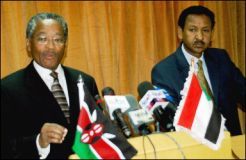Khartoum, main southern rebels in final race to clinch peace deal
NAIROBI, Dec 30 (AFP) — The Sudanese government and the main rebel group are battling to clinch a final peace agreement by the deadline on Friday to end Africa’s longest-running conflict in southern Sudan.

|
|
Kenyan Foreign Minister Chirau Ali Mwakwere (L) speaks to reporters with his Sudanese counterpart Mustafa Osman Ismail during talks earlier this month in Kenya. (AFP). |
The Sudan People’s Liberation Movement/Army (SPLM/A) and the government are finalising details on technical and military aspects of a permanent ceasefire and implementation modalities of the final deal, which is expected to be signed sometime in January, with the African Union (AU) and Khartoum citing January 10 as the most likely date.
“We believe that an agreement will be ready by December 31,” a mediation official told AFP from the talks’ venue in Kenya’s northwestern town of Naivasha.
The last round is being held amid high expectations, after both sides pledged in writing to the UN Security Council last month to sign a final peace deal by December 31, when a temporary truce is also due to expire.
According to an earlier security deal, a permanent ceasefire will come into force when a final peace deal is signed.
The deal does not cover another 22-month conflict in Sudan’s western Darfur region, where 70,000 people have died and 1.6 million others displaced, but Sudan watchers have said it will go a long way to improving the atmosphere for Darfur peace talks.
“The conclusion of talks between the two parties will usher the people of Sudan into a new era that will lead to an equitable political dispensation in the country, as well as create a conducive condition for the resolution of the conflict in Darfur,” AU Commission Chairman Alpha Oumar Konare said in a statement this week.
Delegates from both sides started peace talks in Kenya early 2002 and reached a key deal in July the same year granting the south right to self-determination, after which they got stuck on other issues in the wake of renewed clashes in the southern towns of Torit and Kapoeta.
This prompted Sudan’s Vice President Ali Osman Taha and SPLM/A leader John Garang to intervene in September 2003 with a promise to stick to the truce and wrap up the whole peace process in good time.
Since then, the two leaders have managed to agree on protocols on power and wealth-sharing, management of national security and administration of disputed regions in the centre of the country during the post-conflict interim period.
The Sudan war erupted in 1983 when the rebels rose up against Khartoum to end Arab and Muslim domination and marginalisation of the black, animist and Christian south.
The war and its effects have killed at least 1.5 million people and displaced four million others in the former British colony that got its independence in 1956.
While religion has also fueled the war, control of natural resources has also played an increasing role since August 1999, when Sudan first exported its oil, discovered by Chevron in 1978.
Sudan produces around 250,000 barrels a day of oil, most of it from swamps and savannah grasslands in the south.
The final peace deal will allow both sides to expand exploration in a country reported to have more than three billion barrel reserves, as well as attract foreign oil firms.
Sanctions linked to Khartoum’s alleged support of international terrorism have also prevented foreign firms from operating in Sudan.
However, relations between Khartoum and Washington, traditionally close to Garang, have thawed considerably over recent years, with US President George W. Bush’s administration taking a very active role in the peace process.
The first peace agreement between the south and the north, which was signed in 1972 in Addis Ababa, collapsed in 1983 after then president Gaafar Nimeiri tried to impose Islamic law in the south in defiance of a truce.
